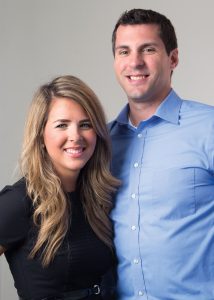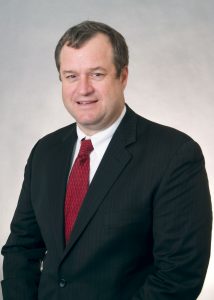Photos: Brandon Parigo
Chris Longly (EMBA ‘13) and Latoya Goree know a thing or two about smart money management.
Longly is a financial advisor at Merrill Lynch Wealth Management and president of the Bloch Alumni Association. Goree is director of the UMKC Office of Financial Literacy.
Together, they created personalized plans for three UMKC alumni: A young educator who wants to buy a home, a couple thinking about having children, and a father of two preparing for retirement.

Kirsten Brown (B.A. ’12)
Occupation: High school principal
Financial Goals: Save as much as possible, purchase a condo in 18-24 months
The “big thing” for Kirsten
LG: A budget is critical for her. She’s going to have to start somewhere with her savings.
CL: She’s young and time is on her side. Creating better money habits now will significantly change her life in the years to come.
On filing taxes
LG: She needs to work with a tax professional to make sure she is claiming the right exemptions and deductions. That way, she can understand her refund and use it for the rest of the year.
CL: Contributing to tax-deferred accounts (like a 403(b), 401(k), IRA, etc.) will allow her to reduce her taxable income while saving for retirement. She should also consider contributing to a Health Savings Account (HSA).
On buying a condo
LG: In the long-term, you’re building equity if you purchase a home. Although renting gives you flexibility to move whenever you want, at the end of the day, you don’t own anything.
CL: Start saving money now for a down payment. Putting down 20 percent or more will eliminate costly Private Mortgage Insurance (PMI) and likely provide access to more attractive loan rates.

Karen Miazga-Blackwood (B.A. ’09) and Steve Blackwood
Occupations: Instructional coach in schools (Karen) and sales professional (Steve)
Financial Goals: Think ahead to retirement, pay off mortgage, plan for children
The “big thing” for Karen and Steve
LG: Budgeting is key for them, especially if Steve is in sales, because that means his income could fluctuate. If he has a base salary that doesn’t change, I would budget off of that. Then, the commission is gravy.
CL: Interest can be your best friend or your worst enemy. When you’re young and you put away money, it grows. Debt works the same way. If you don’t pay it off, your interest gets out of control.
On starting a family
LG: If they eventually want to have a child, they should start saving today. Or yesterday. Start an emergency fund first, then an additional baby fund later. Their budget has to be re-evaluated all the time.
CL: If they decide to have children, they should consider starting a 529 college saving plan after the child is born. These plans allow earnings to grow tax-free if used for qualified education expenses in the future.
On paying off debt
LG: They should start saving toward all their goals, but they should also prioritize one —
the house.
CL: Most people aren’t aware of this simple trick, but if you make one extra mortgage payment every year, you’ll reduce your 30-year mortgage to a 23-year mortgage.

Leo Hirner (M.S. ’89)
Occupation: IT and academic administrator
Financial Goals: Retire and have the house paid off within the next 10 years
The “big thing” for Leo
LG: It seems that he has a lot he wants to accomplish in about 10 years, so if he doesn’t have a financial planner, it’s critical for him to work with someone now.
CL: Health care is one of the biggest expenses in retirement. Maximizing a Health Savings Account (HSA) now will allow his contributions to grow tax-free for use with future medical expenses. Consider long-term care insurance, as this is another major expense in retirement.
On paying off a mortgage
LG: If he prioritized early-on, it won’t be hard for him to catch up. It really depends how much effort he put in in his earlier days.
CL: He should definitely increase his mortgage payments or make extra payments. It would be unwise to go into retirement with a mortgage when you no longer have regular income.
On preparing for retirement
LG: If he hasn’t put anything into an HSA, he should look into it now. The older you get, the more health expenses you’ll have, so he should prioritize that.
CL: He’ll soon be an empty nester, and it’s the perfect time to focus purely on saving for retirement. Contribute maximum amount to retirement accounts and invest excess cash in a diversified brokerage portfolio.
